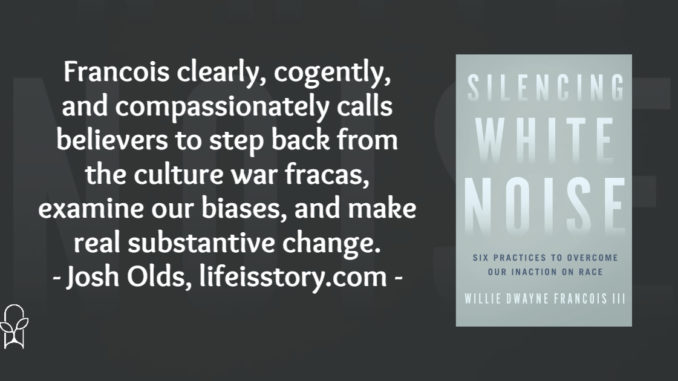
Published by Brazos Press on August 16, 2022
Genres: Non-Fiction, Racial Reconciliation
Buy on Amazon
Goodreads
Racism is omnipresent in American life, both public and private. We are immersed in what prominent Black church leader Willie Dwayne Francois III calls white noise--the racist speech, ideas, and policies that lull us into inaction on racial justice. White noise masks racial realities and prevents constructive responses to microaggressions, structural inequality, and overt interpersonal racism.
In this book, Francois calls people of all races to take up practices that overcome silence and inaction on race and that advance racial repair. Drawing from his antiracism curriculum, the Public Love Organizing and Training (PLOT) Project, Francois encourages us to move from a "colorblind" stance and mythic innocence to one that takes an honest account of our national history and acknowledges our complicity in racism as a prelude to antiracist interventions.
Weaving together personal narrative, theology, and history, this book invites us to engage 6 "rhythms of reparative intercession." These are six practices of antiracism that aim to repair harm by speaking up and "acting up" on behalf of others. Silencing White Noise offers concrete ways to help people wrest free from the dangers of racism and to develop lifelong Christian antiracist practices.
There have been droves of books on antiracism, both for the general market and specifically designed for the Christian market. Silencing White Noise is the latter, written by Willie Francois III, president of the Black Church Center for Justice and Equality. Dr. Francois is an assistant professor of liberation theology at New York Theological Seminary, directs a master’s program at Sing Sing Correctional Facility, and pastors Mount Zion Baptist Church. He also created the PLOT (Public Love Organizing and Training) Project, which features prominently in the book.
Silencing White Noise identifies six practices—what Francois calls “rhythms of reparative intercession”—to combat racism and overcome what he sees as racial inaction. Writing in the time post-George Floyd in the wake of protests and the Black Lives Matter movement, including the proliferation of literature on antiracism in secular and Christian circles, that contention that we still tend toward inaction regarding race at first seems a little naïve. Have we really not been acting? But look around and listen and you’ll find that while, yes, there has been movement forward and, yes, there is more awareness, all of that progress is still surrounded and contained within “white noise” that provides superficial changes while not really addresses the systemic and cultural realities of racism and inequality.
Francois is clear in the book’s introduction that when he speaks of “Whiteness,” he has in mind not skin color but the “conscious or unconscious deference to unfounded notions of White superiority.” Silencing White Noise also takes the position that people of all ethnic and social backgrounds—not just white Europeans—bear the responsibility for change. While some of his book is a call to White people to repent and change, some of it is also a call to Black and other minority communities to rid themselves of the white noise among them and step up and speak up. It isn’t the job of the oppressed to teach the oppressor to be better. Or is it? That’s a difficult statement, but Francois argues that non-White people must take decisive action to silence white noise and not wait around on oppressive people or systems to change themselves.
To do this, he advocates for six practices of combating white noise:
- Embrace Difference as a Gift. I don’t see color. We’re all the same in Christ.
- Confront the Histories of Whiteness. It’s not my fault. Slavery was so long ago.
- Honoring our Interdependence. I’ve had it hard too, but I worked hard.
- Exploring our Fuller Selves. Why does everything have to be about race?
- Sacrificing our Power and Privilege. It’s not my job to fix racism.
- Naming our Complicity. I’m scared of the backlash.
I found it interested—perhaps taking a cue from his chapter on naming our complicity, that Francois lists ways in which he has been complicit in racism. He talks about how, in his past, white noise affected his view of the Black church and how he believed and engaged in racist tropes. That personal admission allows him space to not just be saying to white people “This is what you need to do” but gather in all Christians under a big tent and say “Let’s work together to fix this.”
In some sense, there’s not much that’s new in this book. There’s nothing revolutionary. Well. Revolutionary meaning never-before-said. The whole book is revolutionary in the best of ways. Where Silencing White Noise stands out is in its framing and in Francois’s personal experience. He clearly, cogently, and compassionately calls believers to step back from the culture war fracas, examine our biases, and make real substantive change to our thinking and our systems.
